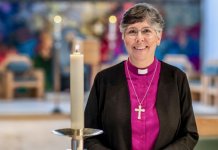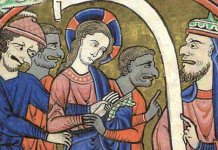I have been anticipating the publication of the Living in Love and Faith document and material for some time, knowing in advance that it was highly unlikely to advance the expectations of lesbian, gay, bisexual, transgender and intersex people, our families, friends, allies and congregations that the Church of England might make a radical commitment to our full and equal inclusion, expectations that have been building for decades.
In 2018 I wrote a strategy paper that included the following goals for LGBTI members of the Church of England against which my assessment of LLF would be judged:
- Approval for the blessing of same sex relationships in church
- Approval of a liturgy for the blessing of same sex relationships
- Acceptance that many lesbian and gay clergy live in (if we have to use the phrase) a sexually active, permanent, stable, faithful relationship with their partner.
- Removal of the quadruple lock preventing the Church of England from solemnising same sex marriages and revision of the marriage canons to allow clergy to solemnise them and for equal marriages to take place in Church of England churches.
- Challenge the misuse of the Bible and of theologies dependent on this misuse that underpin teaching and practice towards LGBTI people that fuel prejudice against us leading to extreme examples of abuse. The misuse of the seven ‘clobber texts’ and the exegesis based on them results in prejudice and homophobia. The enforced suppression of a person’s identity can result in inappropriate and abusive behaviour that underlies safeguarding issues in the church and is a matter for examination by the National Safeguarding Team.
- Develop a theology of sexuality and gender that responds to the transformed understanding of how gender and sexuality are constructed.
- Pay attention to the acceptance of more fluid gender identities among the under thirties.
- Enhance understanding of Transgender and Intersex people.
- Urge lesbian, gay and bisexual bishops to come out. There are implications for the twelve lesbian and gay bishops in the closet (to which there must be added a number of bisexual bishops). The closeted LGB bishops involved in the Living in Love and Faith process are deeply compromised by their continuing secrecy.
I argued that we needed to develop a strategy for change that educates the church establishment (House and College of Bishops, Archbishops’ Council, Church House secretariat, General Synod) about the expectations of LGBTI people that the Archbishops’ claimed are authentic: “that no person is a problem or an issue, people are made in the image of God, all of us, without exception, are loved and called in Christ, and there are no ‘problems’, there are simply people called to redeemed humanity in Christ are to be fulfilled, celebrating our common humanity without exception, without exclusion.” The establishment needs to be educated about what a radical new Christian inclusion in the Church means in reality, based on good, healthy, flourishing relationships and a twenty-first century understanding of being human and being sexual.
Has the LLF process and the material published this week risen to this challenge? No. The House of Bishops continue to demonstrate an ability to maintain control of the process and to avoid responsibility for change. A gulf has opened between the hierarchy/establishment and local church congregations and clergy. Bishops want to impose teaching and practice that many clergy and congregations have already rejected and do their best to ignore.
The House of Bishops is responsible for the failure of this, the latest of many reports, to propose any changes that would radically change the status of LGBTI people in the Church. Their motion on proposals following the Pilling Report was defeated in Synod by the House of Clergy. The Archbishops promised to respond to this, think again, and offer a new way forward. This way forward morphed into the LLF process and has resulted in exactly what the House of Bishops originally wanted in 2017. The House of Bishops has skilfully got its own way yet again and taken control under the cloak of appearing to involve many more people in the process. People were duped. Tina Beardsley confronted this abuse and resigned and Sara Gillingham withdrew her involvement. Other LGBTI members of the process were either in the closet or allowed themselves to become agents of the House of Bishops. Marcus Green, who was invited to join LLF at the same time Tina Beardsley resigned in anger, has blogged about his experience. On his blog he lists some of the sorts of things he experienced during his time on LLF:
- LGBTQ people being repeatedly ignored
- LGBTQ people not being noted in minutes
- Questions raised by LGBTQ people being omitted from the official record
- LGBTQ people not being treated as equals
- Off-colour comments being made by straight project officers as ‘humorous’ asides, comments which made LGBTQ members feel very uncomfortable
- LGBTQ people being attacked in character terms when straight people who spoke out were not regarded that way
- Power abuse by straight senior members against LGBTQ people
- Promises to LGBTQ people about involvement and consultation being repeatedly broken
What do LGBTI members of the Church of England do now? Launch a new campaign against the inadequacies of LLF? Carry on colluding with the bishops? Live dishonestly but lovingly in their supposedly forbidden sexual relationships? Die before the Church gets around to legalising and celebrating fully equal marriage? Find themselves excluded from the church as several of us have? None of the gay activists who have been ejected by the church, myself included, were invited to contribute in any way to LLF. The bishops had already begun to exclude us.
Meanwhile, the process, with its prolific resources, continues. The resources are only of value to one group of people – bishops. They who commissioned the LLF process and have been integral in producing the report are the one group who need to work through their own blind spots. The majority of people in the majority of congregations have been working through this for over twenty years and have already got there – prejudice and anxieties overcome with the help of their LGBTI sons, daughters, fathers, mothers, siblings, cousins, aunts uncles, friends and colleagues.
The bishops controlled the production and content of the LLF book and course. The bishops are taking sole responsibility for overseeing the next stage of the process and for bringing proposals to General Synod in 2022. Nothing will change then unless the bishops agree change is essential. This will not happen unless individual bishops break rank. I challenge members of the House of Bishops who claim to be fully supportive of LGBTI people to publicly dissent from this process.










